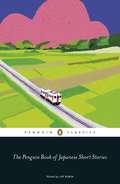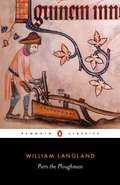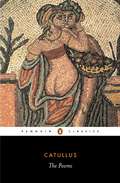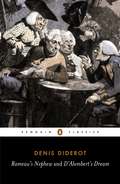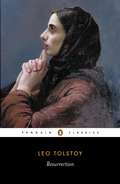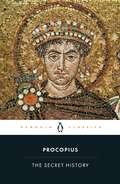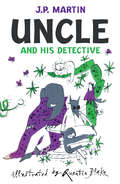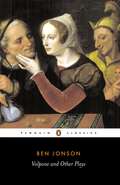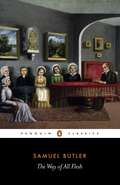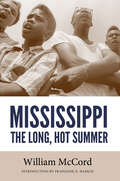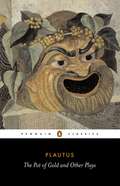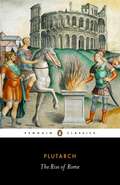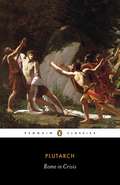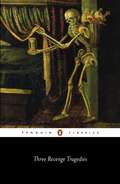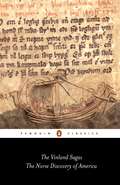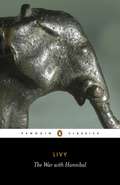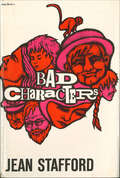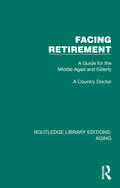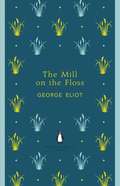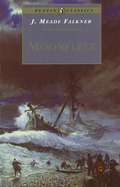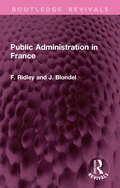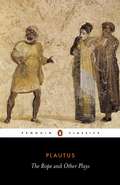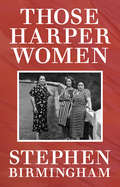- Table View
- List View
The Penguin Book of Japanese Short Stories
by Haruki Murakami and Jay RubinThis fantastically varied and exciting collection celebrates the great Japanese short story, from its modern origins in the nineteenth century to the remarkable works being written today. Short story writers already well-known to English-language readers are all included here - Tanizaki, Akutagawa, Murakami, Mishima, Kawabata - but also many surprising new finds. From Yuko Tsushima's 'Flames' to Yuten Sawanishi's 'Filling Up with Sugar', from Shin'ichi Hoshi's 'Shoulder-Top Secretary' to Banana Yoshimoto's 'Bee Honey', The Penguin Book of Japanese Short Stories is filled with fear, charm, beauty and comedy.Curated by Jay Rubin, who has himself freshly translated several of the stories, and introduced by Haruki Murakami, this book will be a revelation to its readers.
Piers the Ploughman
by William LanglandWritten by a fourteenth-century cleric, this spiritual allegory explores man in relation to his ultimate destiny against the background of teeming, colorful medieval life.
The Poems (Classics Ser.)
by CatullusOne of the most versatile of Roman poets, Catullus wrote verse of an almost unparalleled diversity and stylistic agility, from the brevity of the epigram to the sustained elegance of the elegy. This collection contains all of Catullus' extant work and includes his lyrics to the notorious Clodia Metelli - married, seductive and corrupt - charting the course from rapturous delight in a new affair to the torment of love gone sour; poems to his young friend Iuventius; and longer verse, such as the extraordinary tale of Attis, a Greek youth who castrates himself in a fit of religious ecstasy. Ranging from the tender, moving and passionate to the vicious and even obscene, these are poems of astonishingly modern force and content.
Rameau's Nephew / D'alembert's Dream
by Denis DiderotOne of the key figures of the French Enlightenment, Denis Diderot was a passionate critic of conventional morality, society and religion. Among his greatest and most well-known works, these two dialogues are dazzling examples of his radical scientific and philosophical beliefs. In Rameau's Nephew, the eccentric and foolish nephew of the great composer Jean-Philippe Rameau meets Diderot by chance, and the two embark on a hilarious consideration of society, music, literature, politics, morality and philosophy. Its companion-piece, D'Alembert's Dream, outlines a material, atheistic view of the universe, expressed through the fevered dreams of Diderot's friend D'Alembert. Unpublished during his lifetime, both of these powerfully controversial works show Diderot to be one of the most advanced thinkers of his age, and serve as fascinating testament to the philosopher's wayward genius.
Resurrection
by Leo TolstoyServing on a jury at the trial of a prostitute arrested for murder, Prince Nekhlyudov is horrified to discover that the accused is a woman he had once loved, seduced and then abandoned when she was a young servant girl. Racked with guilt at realizing he was the cause of her ruin, he determines to appeal for her release or give up his own way of life and follow her. Conceived on an epic scale, Resurrection portrays a vast panorama of Russian life, taking us from the underworld of prison cells and warders to the palaces of countesses. It is also an angry denunciation of government, the upper classes, the judicial system and the Church, and a highly personal statement of Tolstoy's belief in human redemption.
The Secret History
by ProcopiusA trusted member of the Byzantine establishment, Procopius was the Empire's official chronicler, and his History of the Wars of Justinian proclaimed the strength and wisdom of the Emperor's reign. Yet all the while the dutiful scribe was working on a very different - and dangerous - history to be published only once its author was safely in his grave. The Secret History portrays the 'great lawgiver' Justinian as a rampant king of corruption and tyranny, the Empress Theodora as a sorceress and whore, and the brilliant general Belisarius as the pliable dupe of his scheming wife Antonina. Magnificently hyperbolic and highly opinionated, The Secret History is a work of explosive energy, depicting holy Byzantium as a hell of murder and misrule.
Tales of the Jazz Age (Collins Classics Ser. #Vol. 1)
by F. Scott Fitzgerald'The Curious Case of Benjamin Button' sees a baby born in 1860 begin life as an old man and then age backwards. F. Scott Fitzgerald hinted at this kind of inversion when he called his era 'a generation grown up to find all Gods dead, all wars fought, all faiths in man shaken'. Perhaps nowhere in American fiction has this 'Lost Generation' been more vividly preserved than in Fitzgerald's short fiction. Spanning the early twentieth-century American landscape, this collection captures, with Fitzgerald's signature blend of enchantment and disillusionment, America during the Jazz Age.
Uncle And His Detective
by J. P. Martin Quentin BlakeIt begins with the arrival not of a detective, but of disaster: Badfort is for sale, but when Uncle decides to buy it, demolish it, and build a pleasantly appointed park on the site, he is forestalled. Beaver Hateman has sold it cheaply to someone on the condition that he, Hateman, is allowed to stay on as a paying guest. Forgetting that the man who has bought Badfort is certain to regret the "bargain", Uncle tries to console himself by continuing his never-ending exploration of Homeward. He soon discovers the mysterious Crack House - lair of a vicious and horribly squawking creature, half-bat, half-bird, called Batty - where there are rumours of buried treasure. Uncle is in need of a detective . . .
Volpone and Other Plays
by Ben JonsonThe three plays collected in this volume depict the faults, errors and foibles of ordinary people with exuberant humour, savage satire and acute observations. Volpone portrays a rich Venetian who pretends to be dying so that his despised acquaintances will flock to his bedside with extravagant gifts in hope of an inheritance. The Alchemist also deals with greed and gullibility, as a rascally trio of confidence tricksters, claiming to have the legendary Philosopher's Stone, fool a series of victims who are hoping to make some easy money. And in a wonderfully energetic portrait of Jacobean life, Bartholomew Fair shows a diverse group of Londoners sampling the delights and temptations of the Fair - and the traders, prostitutes and cutpurses who set out to exploit them.
The Way of All Flesh
by Samuel Butler'I am the enfant terrible of literature and science. If I cannot, and I know I cannot, get the literary and scientific big-wigs to give me a shilling, I can, and I know I can, heave bricks into the middle of them.' With The Way of All Flesh, Samuel Butler threw a subversive brick at the smug face of Victorian domesticity. Published in 1903, a year after Butler's death, the novel is a thinly disguised account of his own childhood and youth 'in the bosom of a Christian family'. With irony, wit and sometimes rancour, he savaged contemporary values and beliefs, turning inside-out the conventional novel of a family's life through several generations.
Mississippi: The Long, Hot Summer (Civil Rights in Mississippi Series)
by William McCordIn 1964, sociologist William McCord, long interested in movements for social change in the United States, began a study of Mississippi's Freedom Summer. Stanford University, where McCord taught, had been the site of recruiting efforts for student volunteers for the Freedom Summer project by such activists as Robert Moses and Allard Lowenstein. Described by his wife as “an old-fashioned liberal,” McCord believed that he should both examine and participate in events in Mississippi. He accompanied student workers and black Mississippians to courthouses and Freedom Houses, and he attracted police attention as he studied the mechanisms of white supremacy and the black nonviolent campaign against racial segregation. Published in 1965 by W. W. Norton, his book, Mississippi: The Long, Hot Summer, is one of the first examinations of the events of 1964 by a scholar. It provides a compelling, detailed account of Mississippi people and places, including the thousands of student workers who found in the state both opportunities and severe challenges. McCord's work sought to communicate to a broad audience the depth of repression in Mississippi. Here was evidence of the need for federal action to address what he recognized as both national and southern failures to secure civil rights for black Americans. His field work and activism in Mississippi offered a perspective that few other academics or other white Americans had shared. Historian Françoise N. Hamlin provides a substantial introduction that sets McCord's work within the context of other narratives of Freedom Summer and explores McCord's broader career that combined distinguished scholarship with social activism.
The Pot of Gold and Other Plays
by PlautusOne of the supreme comic writers of the Roman world, Plautus (c.254-184 BC), skilfully adapted classic Greek comic models to the manners and customs of his day. This collection features a varied selection of his finest plays, from the light-hearted comedy Pseudolus, in which the lovesick Calidorus and his slave try to liberate his lover from her pimp, to the more subversive The Prisoners, which raises serious questions about the role of slavery. Also included are The Brothers Menaechmus, which formed the prototype for Shakespeare's The Comedy of Errors, and The Pot of Gold, whose old miser Euclio is a glorious study in avarice. Throughout, Plautus breathes new, brilliant life into classic comic types - including deceitful twins, scheming slaves, bitter old men and swaggering soldiers - creating an entertaining critique of Roman life and values.
The Rise of Rome
by PlutarchThe biographies collected in this volume bring together Plutarch's Lives of those great men who established the city of Rome and consolidated its supremacy, and his Comparisons with their notable Greek counterparts. Here he pairs Romulus, mythical founder of Rome, with Theseus, who brought Athens to power, and compares the admirable Numa and Lycurgus for bringing order to their communities, while Titus Flamininus and Philopoemen are portrayed as champions of freedom. As well as providing an illuminating picture of the first century AD, Plutarch depicts complex and nuanced heroes who display the essential virtues of Greek civilization - courage, patriotism, justice, intelligence and reason - that contributed to the rise of Rome.These new and revised translations by W. Jeffrey Tatum and Ian Scott-Kilvert capture Plutarch's elegant prose and narrative flair. This edition also includes a general introduction, individual introductions to each of the Lives and Comparisons, further reading and notes.The Rise of Rome is the penultimate title in Penguin Classics' complete revised Plutarch in six volumes. Other titles include Rome In Crisis, On Sparta, Fall of the Roman Republic, The Age of Alexander and The Rise and Fall of Athens (forthcoming 2014).
Rome in Crisis
by PlutarchBringing together nine biographies from Plutarch's Parallel Lives series, this edition examines the lives of major figures in Roman history, from Lucullus (118-57 BC), an aristocratic politician and conqueror of Eastern kingdoms, to Otho (32-69 AD), a reckless young noble who consorted with the tyrannical, debauched emperor Nero before briefly becoming a dignified and gracious emperor himself.Ian Scott-Kilvert's and Christopher Pelling's translations are accompanied by a new introduction, and also includes a separate introduction for each biography, comparative essays of the major figures, suggested further reading, notes and maps.
Three Revenge Tragedies
by Cyril Tourneur John Webster Thomas MiddletonFollowing the end of Queen Elizabeth's reign in the early seventeenth century, the new court of King James was beset by political instability and moral corruption. This atmosphere provided fertile ground for the dramatists of the age, whose plays explore the ways in which social decadence and the abuse of power breed resentment and lead inexorably to violence and bloody retribution. In Tourneur's The Revenger's Tragedy, the debauched son of an Italian Duke attempts to rape the virtuous Gloriana - a veiled reference to Elizabeth I. Webster's The White Devil depicts a sinister world of intrigue and murderous infidelity, while The Changeling, perhaps Middleton's supreme achievement, powerfully portrays a woman bringing about her own unwitting destruction. All three are masterpieces of brooding intensity, dominated by images of decay, disillusionment and death.
The Vinland Sagas: The Norse Discovery of America
by Magnus Magnusson Hermann PalssonOne of the most arresting stories in the history of exploration, these two Icelandic sagas tell of the discovery of America by Norsemen five centuries before Christopher Columbus. Together, the direct, forceful twelfth-century Graenlendinga Saga and the more polished and scholarly Eirik's Saga, written some hundred years later, recount how Eirik the Red founded an Icelandic colony in Greenland and how his son, Leif the Lucky, later sailed south to explore - and if possible exploit - the chance discovery by Bjarni Herjolfsson of an unknown land. In spare and vigorous prose they record Europe's first surprise glimpse of the eastern shores of the North American continent and the natives who inhabited them.
The War with Hannibal: The History of Rome from its Foundation Books 21-30
by LivyIn The War with Hannibal, Livy (59 BC-AD 17) chronicles the events of the Second Punic War between Rome and Carthage, until the Battle of Zama in 202 BC. He vividly recreates the immense armies of Hannibal, complete with elephants, crossing the Alps; the panic as they approached the gates of Rome; and the decimation of the Roman army at the Battle of Lake Trasimene. Yet it is also the clash of personalities that fascinates Livy, from great debates in the Senate to the historic meeting between Scipio and Hannibal before the decisive battle. Livy never hesitates to introduce both intense drama and moral lessons into his work, and here he brings a turbulent episode in history powerfully to life.
Bad Characters: Stories
by Jean StaffordThis book displays at their height the wit, sensibility and psychological penetration that distinguish Miss Stafford's work. There are nine stories and a novella. They range in mood from the title story, a comic portrait of a resourceful child-criminal named Lottie Jump, to "The End of a Career," an elegiac and ironic tale of the declining years of a great beauty. In "A Reasonable Facsimile" Dr. Bohrmann, a retired professor philosophy, is unexpectedly rescued from an aggressively boring young house guest. "Cops and Robbers" is a chilling story of childhood horror and lovelessness that revolves around a father's trip to the barber with his five-year-old daughter.Several of the stories have as their common setting Miss Stafford's fiction town of Adams, Colorado—including an amusing saga of a girl's frustrated attempts to find a quiet spot to read ("A Reading Problem"), and two stories of failure ("In the Zoo") and success ("The Liberation") in the effort to escape from one's family. "Caveat Emptor" is a satire on the academic life and sub-life at the Alma Hettrick College for Girls; and in "The Captain's Gift" the sheltered and lavender-scented existence of old Mrs. Ramsey is violated by the reality of war.The major piece in Bad Characters is "A Winter's Tale," a haunting and evocative novella set in Heidelberg just before the outbreak of the war. It is dominated by the diabolic character of Frau Professor Persis Galt. This portrait of a former Bostonian who poses as an excessively devout convert is one of Miss Stafford's most brilliant fictional creations.This collection by Jean Stafford will be warmly welcomed by the many and devoted admirers of her novels and stories. To new readers the work of one of the best writers of our time will come as a joyful discovery.
Facing Retirement: A Guide for the Middle Aged and Elderly (Routledge Library Editions: Aging)
by A Country DoctorOriginally published in 1960 and revised in 1964 the blurb for Facing Retirement read:“Mature men and women are not afraid of advancing years. More and more seek to prepare themselves for retirement so that they may then find all the happiness they can.This phase of life is interesting to a widening circle, and in writing this book it was the author’s aim to discuss readably, simply, and from his experience with his patients, most relevant aspects of these later years. It was a pioneer in its approach: any similar books which may follow, if they help to lessen the burden of the elderly and aged which has to be sustained by the younger generations, must be of the highest importance not only to individuals but to the nation.For nearly thirty years the author of this book has had the medical care of over 2,000 people of all ages in a cluster of villages and hamlets at the foot of the Cotswold Hills. He has been chairman or president of the County Association for the Care of old People since its inception in 1952.”Today it can be read and enjoyed in its historical context.
The Mill on the Floss (The Penguin English Library)
by George EliotWith an essay by Walter Allen.If life had no love in it, what else was there for Maggie?Tragic and moving, The Mill on the Floss is a novel of grand passions and tormented lives. As the rebellious Maggie's fiery spirit and imaginative nature bring her into bitter conflict with her narrow provincial family, most painfully with her beloved brother Tom, their fates are played out on an epic scale. George Eliot drew on her own frustrated rural upbringing to create one of the great novels of childhood, and one of literature's most unforgettable heroines.The Penguin English Library - 100 editions of the best fiction in English, from the eighteenth century and the very first novels to the beginning of the First World War.
Moonfleet
by John Meade FalknerEveryone in the tiny village of Moonfleet lives by the sea one way or another, so it's no surprise when young John Trenchard gets involved in the smuggling trade. Forced to flee England with a price on his head, John little guesses the adventures and trials he will have before he sees Moonfleet again or the change in his fortunes when he does.
Parallel Text: Deutsche Kurzgeschichten
by Richard NewnhamMuch maligned in pre-war Germany, the short story enjoyed a creative rebirth in 1945. Initially imported by the Allies, the form also matched perfectly the prevailing mood of irony, objectivity and mistrust of the didactic. With the original German text running alongside English translations, this collection features stories from eight outstanding post-war authors including Heinrich Böll, Ilse Aichinger and Reinhard Lettau which students will find both educational and engrossing. Böll’s opening story 'Pale Anna' follows a soldier returning home, his situation comparable to that of the writer in the first months of peace: he knows no-one and has few words not linked to painful memories. This poignant narrative is followed by a variety of tales representing the diversity of the time and including satires, explorations of private obsessions and experiments in form and language.
Public Administration in France (Routledge Revivals)
by F. F. Ridley J. BlondelOriginally published in 1964, this book was an important addition to the growing field of comparative government and administration. This book covers the organisation of the French cabinet, the structure and functions of government departments and of local authorities, the civil service, the police, the judiciary and public enterprise. There are also chapters on economic planning, the administration of social services and of the educational system. The book explains the spirit as well as the mechanism of the French administrative system, the principles that underly it and the wider background against which it is set
The Rope and Other Plays
by PlautusBrilliantly adapting Greek New Comedy for Roman audiences, the sublime comedies of Plautus (c. 254 -184 bc ) are the earliest surviving complete works of Latin literature. The four plays collected here reveal a playwright in his prime, exploring classic themes and developing standard characters that were to influence the comedies of Shakespeare, Molière and many others. In The Ghost, a dissolute son who has squandered his father's money is thrown into disarray when he returns from abroad, a theme that is explored further in the comedy of errors A Three-Dollar Day. In The Rope - regarded by many as the best of Plautus' plays - the shipwreck of a pimp and his slaves leads to the touching reunion of a father and his daughter, while Amphitryo, Plautus's only excursion into divine mythology, offers a cheerful account of how Jupiter became father to Hercules.
Those Harper Women
by Stephen BirminghamFour generations of women grapple with the gilded cage of their family dynasty in this #1 New York Times–bestselling author&’s &“big, bustling novel&” (The New York Times). Meredith Harper made millions in rum before Prohibition ruined the market. When he died, he left behind an estate of such vast wealth that his descendants were set for life—but what sort of life would it be? In Those Harper Women, Stephen Birmingham presents a fictional group portrait of women who pass down both fortunes and misfortunes, who want for nothing save happiness. Across generations, the Harper women seek joy, self-fulfillment, or mere escape from the trappings of their privilege. But through trips to Europe and the Caribbean, through marriage and divorce, the women find themselves returning time and again to the looming shadow of Meredith and his money.
